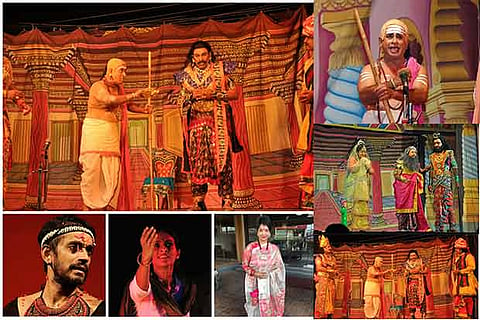

Chennai
I regard the theatre as the greatest of all art forms, the most immediate way in which a human being can share with another the sense of what it is to be a human being,” Oscar Wilde once said. V Balakrishnan, founder and artistic director of Theatre Nisha, agrees to this famous quote and tells us, “The theatre scene in Chennai is definitely thriving, purely, because of the personal interest of actors, directors and designers. The concept of watching a play is to participate in a communion — a participatory act between the audience and the actors. Theatre questions our social context and tries to redefine it. It has become a light, palpable environment for change. One of the major changes that has happened is that the myth surrounding theatre has been busted — people aren’t anymore scared of approaching directors asking for roles. This trend is happening in schools and colleges as well; they are now using theatre not only as a tool but also as a subject in their curriculum.”
Though there is a collective identity for the theatre scene in Chennai, the validation and patronage of the audience have changed; especially, after the advent of YouTube, podcast, etc. “The attention span of the audience has reduced a lot. Earlier, we were able to put up a 2.5-hour play but now it has become tough to stage an hour and 20-minute play. That said, there is still a large number of rasikas who come for our shows.”
Another interesting change Balakrishnan observes is the venue in which plays are staged. “Irrespective of whether revenue has been generated or not, there is no lack of plays in the city. Moreover, many directors have shifted the venue to unconventional places like libraries, houses and so on. Like how chamber concert has got attention, chamber theatre is slowly catching up,” he says.
In Tamil Nadu, the theatre has managed to wed the traditional (the folk) with the modern and that’s one of the reasons why theatre in the state has not suffered a major setback. “Then and now, quality of the play matters the most — be it a historical play, mythological play or even one with a social message. My only concern is that a few doyens, who have made a mark in the film industry, aren’t really supporting the art form anymore. We need to be supportive of each other to sustain,” says Srinivasan Shivpprasadh, a veteran actor.
YG Madhuvanti, a senior theatre personality who has been promoting stage shows in Tamil, says that the theatre is growing in a healthy direction at the moment. “A lot of youngsters these days are looking to entertain audiences from different strata through vernacular theatre. Moreover, new troupes are emerging of late and are presenting interesting subjects. In fact, at least one troupe will be performing in the city every weekend so I consider it rubbish when people say that theatre is a dying art form.”
Akhila Ramnarayan learned theatre, movement and music from her parents at a very young age. An actor with JustUs Repertory, a founding member of Sahrdaya Foundation, and Associate Professor of Practice, Literature and Arts, Krea University, she says, “Two major changes that happened over the years are arrival of new theatre groups and the presence of full-time theatre professionals. The presence of theatre festivals like Short and Sweet has introduced a lot of talent. Though we have powerful, dynamic female presence in theatre like Mangai, Prasanna, Gowri Ramnaryaan, Sunanda Raghunathan, etc, we wanted more women to come to the fore. We need to nurture women’s presence and need to have women-centric productions in which women are featured in all facets of theatre, especially, technical fields,” says Akhila.
The talented actress wants a forum for women to talk about theatre, the challenges they face and how they can take the art form forward. “Just as it’s important to have inclusion in terms of language and types of genres, we need to have a forum to discuss various perspectives of theatre. We are breaking a lot of stereotypes and the audience are ready to welcome it.”
Visit news.dtnext.in to explore our interactive epaper!
Download the DT Next app for more exciting features!
Click here for iOS
Click here for Android